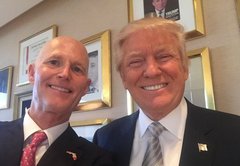Will fight to repeal federal health care law
Rick Scott
Said he would join efforts to repeal the health care law, including supporting a constitutional amendment that "prohibits the federal government from imposing President Obama's individual mandate, to protect Floridians' freedom to control their health care choices."
Scott-O-Meter
Compromise



